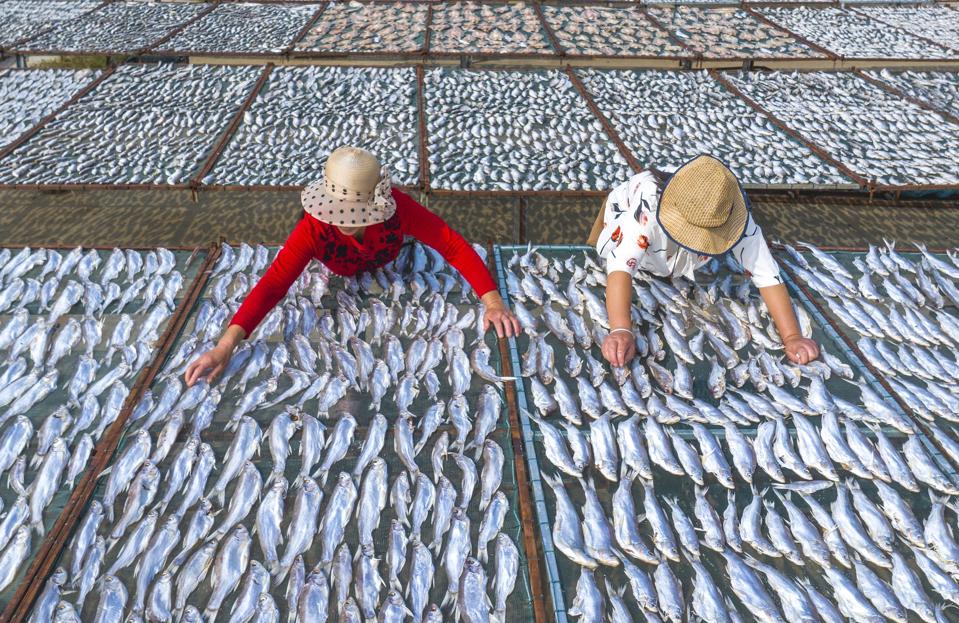As food costs rise, and tariffs began to come into play, are radioactive shrimp just the beginning?
Yesterday, Walmart customers across 13 states were confronted this with an unsettling recall notice: raw frozen shrimp, sold under the retailer’s Great Value brand, were being pulled from shelves after U.S. Food and Drug Administration (FDA) testing detected traces of Cesium-137, a man-made radioactive isotope. The discovery sparked a huge reaction online, a concern about food safety, and also what this episode reveals about a global seafood supply chain already under strain from tariffs, rising costs, and growing consumer mistrust.
According to a press release by FDA officials, the contaminated shrimp originated from Indonesia and was processed by PT. Bahari Makmur Sejati also known as BMS Foods. Due to this recall, BMS Foods is now on the FDA’s “red list,” barred their products from the U.S. until further notice. The radioactive shrimp were detected at four U.S. ports—Los Angeles, Houston, Miami, and Savannah, GA—before an import alert was issued by the FDA. Walmart quickly recalled the affected products at the agency’s direction, advising customers to discard lot numbers – 8005540-1, 8005538-1 and 8005539-1.
While none of the products exceeded federal intervention thresholds for a recall, the suggestion of radioactive shrimp being sold and served on American dinner tables was enough to ignite public anxiety.
The Global Seafood Challenge
Indonesia is one of the world’s top exporters of shrimp, and the United States is the largest purchaser of the crustacean worldwide. In the last 5 years, shrimp sales volume has increased from 275 million to 415 million pounds annually. Yet its aquaculture industry has faced repeated scrutiny for sanitary conditions. Environmental watchdogs have flagged processing facilities where seafood, particularly shrimp, is held in substandard environments, with overcrowded farm raised fishing ponds and questionable sanitary practices designed to cut costs – they are also creating condistions for contamination. And while Indonesia’s Ministry of Maritime Affairs and Fisheries has vowed to introduce a quality and safety assurance system for marine and fisheries products to align with U.S. and global import standards, there is still work to be done.
At the same time, American shrimpers along the Gulf Coast say they are being squeezed out by lower-priced imports, but they are looking forward to the tariffs to ease the pain. Shrimp caught in U.S. waters is generally more expensive, as domestic producers must follow stricter safety protocols. U.S. shrimpers have called on federal regulators to impose stronger protections, warning that unfair foreign trade practices and cheap imports are undermining their livelihood.
But the impending tariffs on imported foods, may further disrupt seafood markets by driving up the costs. The Yale Budget Lab estimates that new tariffs could raise food costs by another 3%, with some categories like fresh produce initially jumping up by 7% and processed rice rising in price by 10.2% in the long term. Other items expected to cost more include cereal, meat and dairy products. For fish and shellfish, the added expense could tempt suppliers and distributors to cut costs elsewhere in the chain— through the reduction of quality controls, or cheaper processing.
Food Prices and Consumer Anxiety
This shrimp recall is hitting at a time when Americans are already deeply uneasy about the cost and safety of their food. According to a recent Associated Press-NORC poll, nearly 90% of U.S. adults report being stressed out regarding the cost of groceries, making it the #1 financial worry ahead of housing, healthcare, and savings.
The data backs up those fears. Over the past year, the Consumer Price Index shows food prices increasing faster than inflation with groceries and restaurants up 2.4% and 3.8% respectively. In just one year, from June 2024 to June 2025, egg prices rose 27.3%, while meats, poultry, and fish climbed 5.6%.
Consumers are absorbing these increases at the same time as they are told to be vigilant about recalls—whether it’s lettuce linked to E. coli, baby formula shortages, or, in this case, shrimp carrying detected radioactive material. Each incident chips away at trust in the food system.
The Bigger Picture
So, are radioactive shrimp just the latest symptom of a broken supply chain—or an isolated event unlikely to be repeated?
The answer may not be clear for months.
The FDA says it is working with Indonesian authorities to trace the source of the contamination and in turn wants to tighten oversight. But the discovery underscores how global food systems, already stretched thin by inflation and tariffs, are vulnerable to lapses that would have once seemed unimaginable.
While some consumers will point to the system working, others will refer to this incident as a cause for deepening anxieties that food is both too expensive and too unreliable.
For businesses, it’s a warning that cutting corners—even through complex, faraway supply chains—can end up costing far more in reputational damage than in upfront savings.
Whether this was a one-off mishap or an early glimpse of what’s ahead, it has landed squarely in the middle of America’s growing uneasiness over what to eat, how much it costs, and whether the system designed to protect consumer interests can still be trusted.

